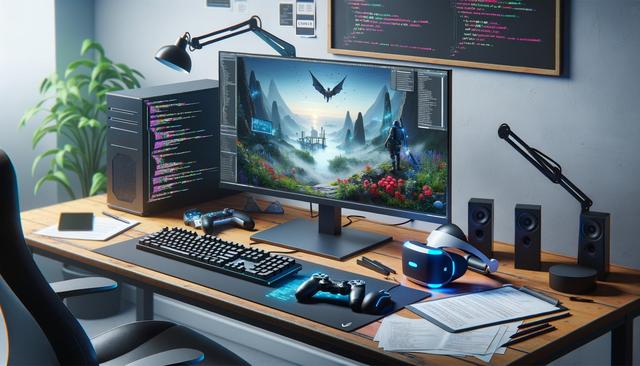Understanding the Role of a Game Developer
At the core of every engaging digital experience lies the creativity and technical expertise of a game developer. Whether working independently or as part of a larger studio, these professionals are responsible for crafting the mechanics, visuals, and logic that bring virtual worlds to life. A game app developer focuses on creating applications for various platforms, often emphasizing mobile devices due to their widespread use. The daily tasks can vary but generally include coding, debugging, and collaborating with artists and designers to ensure every game element functions smoothly. Game development is a multidisciplinary field, combining storytelling, visual design, audio, and software engineering into one cohesive product.
Becoming a game developer often starts with a strong passion for gaming and a curiosity about how games work. Many professionals in the field pursue formal education through game developer schools, which offer specialized programs in game design, computer science, and interactive media. These institutions provide foundational knowledge and exposure to tools commonly used in the industry, such as Unity and Unreal Engine, which are essential for unity 3d developer and unreal developers alike.
Educational Pathways and Skill Development
Formal education is a powerful way to enter the game development industry, but it’s not the only path. Game developer schools offer degrees and certificates that focus on both technical and creative aspects of game creation. These programs often include coursework in:
- Programming languages such as C++, C#, and Python
- Game physics and mechanics
- 3D modeling and animation
- Artificial intelligence in games
- User interface and user experience design
Beyond traditional education, aspiring developers can benefit from online courses, tutorials, and community forums. Building a personal portfolio by working on small projects or collaborating on open-source games is a practical way to demonstrate skills. This is particularly useful for those aiming to become a junior game designer, as entry-level positions often require evidence of hands-on experience and a strong understanding of game design principles.
Choosing a Specialty in Game Development
Game development is a broad field with several areas of specialization. Depending on personal interests and skills, one might choose to focus on front-end design, back-end systems, or a combination of both. A full stack game developer, for example, handles both the user interface and the server-side logic, making them highly versatile in a development team. Other common roles in the industry include:
- Mobile game developers: Specialize in games for iOS and Android platforms
- Unity 3D developers: Use Unity Engine to create 2D and 3D games
- Unreal developers: Work with Unreal Engine for high-end graphics and performance
- Junior game designers: Assist with game concepts, rule design, and playtesting
Choosing a specialty helps streamline your learning path and makes it easier to market your skills to potential employers or clients. Understanding the demands and expectations of each role can also help you determine which area aligns best with your career goals.
Tools and Technologies Game Developers Use
Game developers rely on a variety of tools and software to bring their ideas to life. The choice of technology often depends on the platform, game genre, and team size. Unity and Unreal Engine are two of the most widely used game engines, each offering unique advantages. Unity is favored by many unity 3d developers due to its flexibility and large community, while Unreal Engine is known for its high-fidelity graphics and robust feature set, making it a popular choice among unreal developers.
In addition to game engines, developers use other tools such as:
- Version control systems like Git for collaborative projects
- Integrated development environments (IDEs) such as Visual Studio
- 3D modeling software like Blender or Maya
- Sound editing tools for integrating audio effects and music
Staying updated with the latest tools and industry trends is essential for all developers, whether you’re a game app developer or a full stack game developer. Continuous learning ensures you’re equipped to take on diverse projects and adapt to the evolving landscape of game technology.
Building a Career in Game Development
Turning your passion for gaming into a successful career involves more than just technical skills. Networking, collaboration, and communication are equally important, especially when working in team environments. Aspiring developers should consider attending game jams, participating in online communities, and showcasing their work through personal websites or platforms like GitHub and itch.io.
There are various entry points into the industry, including internships, freelance projects, and junior positions. Starting as a junior game designer or a mobile game developer can provide valuable experience and open doors to more advanced roles over time. Companies often look for developers who are not only skilled but also passionate, adaptable, and eager to grow.
Key strategies for building a career include:
- Creating a diverse and polished portfolio
- Contributing to open-source or community projects
- Networking with industry professionals
- Continuously updating your skills and knowledge
Whether you dream of developing indie games or joining a major studio, the path to becoming a successful game developer is both challenging and rewarding. With dedication, creativity, and a willingness to learn, you can make a lasting impact in the world of interactive entertainment.
Conclusion: Bringing Your Vision to Life
Game development is a dynamic and fulfilling career path that combines technical expertise with artistic creativity. Whether you aim to become a unity 3d developer, a junior game designer, or a full stack game developer, there are multiple avenues to explore and grow within the industry. By leveraging educational resources, honing your skills, and actively engaging with the game development community, you can transform your passion into a meaningful and sustainable career. The virtual worlds you imagine today could become the interactive experiences millions enjoy tomorrow, thanks to your dedication as a game developer.












